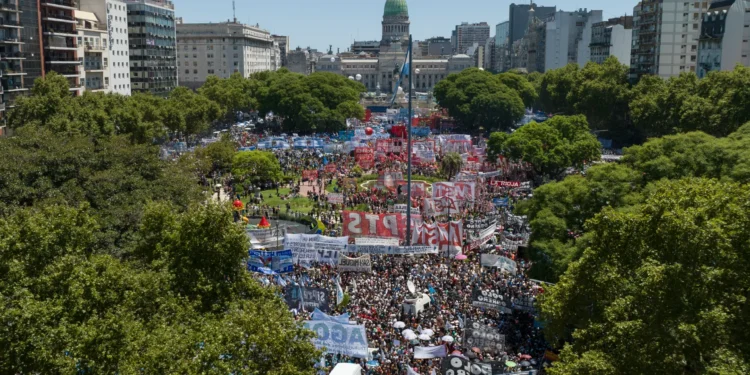Argentina witnessed a massive general strike organized by the country’s largest labor union, protesting against the far-right policies of President Javier Milei. This historic mobilization reflects the urgency felt by workers as Milei pursues radical economic and political reforms, often compared to “shock therapy.”
Unprecedented Mobilization:
The general strike, occurring less than seven weeks into Milei’s presidency, brought parts of downtown Buenos Aires to a standstill. Thousands of protesters gathered in front of Argentina’s Congress, denouncing Milei’s plans to overhaul the government, privatize public industries, and implement austerity measures.
Worker Concerns:
Protesters voiced concerns over steep increases in food prices, rent hikes, and general economic instability since Milei took office. Many, like nurse Elizabeth Gutierrez, expressed the struggle to afford basic necessities, highlighting the adverse effects of Milei’s economic reforms on the working class.
Opposition to Deregulation:
Alicia Pereyra, a 63-year-old retiree, opposed Milei’s efforts to deregulate the economy, fearing that such measures would lead to increased poverty and economic hardship. She emphasized the personal impact of Milei’s reforms on her ability to access necessary medication for chronic illnesses.
Economic Impact and Inflation:
Milei’s early measures, including a 54% devaluation of the Argentinian peso, exacerbated the already high inflation rates. With Argentina ending 2023 with an annual inflation rate of 211.4%, the fastest in Latin America, concerns rise over the economic impact on consumers, leading to potential recession, unemployment, and increased poverty.
Ongoing Reforms:
The nationwide strike coincides with Congress considering a slimmed-down version of Milei’s controversial “omnibus law.” This legislation, if passed, would grant extensive legislative powers to Milei’s executive branch for an emergency period of one year. Critics argue that these reforms undermine democratic institutions.
President’s Response:
Milei dismissed the strike as evidence of resistance to change, claiming there are “two Argentinas” – one seeking progress and another resisting change. Security Minister Patricia Bullrich labeled the union groups organizing the strike as “gangsters” and “guarantors of poverty.”
Public Opinion and Future Challenges:
Despite protests, Milei enjoys broad support among Argentinians, with 55% believing his reform measures are necessary. However, there are indications that respondents prefer gradual changes over immediate, sweeping reforms. The president faces challenges, including a top court invalidating parts of his decrees, and growing opposition may impact the completion of his term.
Argentina’s historic general strike reflects the deep-seated concerns of workers against President Milei’s far-right reforms. As the nation grapples with economic instability, inflation, and significant policy changes, the outcome of this widespread discontent remains uncertain, potentially shaping the political landscape in the coming months.
















